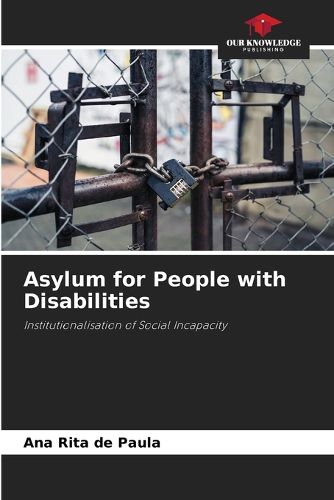Readings Newsletter
Become a Readings Member to make your shopping experience even easier.
Sign in or sign up for free!
You’re not far away from qualifying for FREE standard shipping within Australia
You’ve qualified for FREE standard shipping within Australia
The cart is loading…






This title is printed to order. This book may have been self-published. If so, we cannot guarantee the quality of the content. In the main most books will have gone through the editing process however some may not. We therefore suggest that you be aware of this before ordering this book. If in doubt check either the author or publisher’s details as we are unable to accept any returns unless they are faulty. Please contact us if you have any questions.
Care for people with disabilities is based on a charity-custodial model. This situation arose from public health and rehabilitation policies, which favoured the transfer of resources to the community, keeping care under the aegis of religious humanitarianism. Asylums in their various forms are marginalised from scientific institutions, such as first-line hospitals and rehabilitation centres. These nursing homes provide shelter and basic care for their clients in a very precarious way, worsening the condition of the people interned there and breaking family and social ties once and for all. By characterising a typical hospital institution and analysing interviews with an institutionalised subject using a psychoanalytical framework, the aim was to understand the impact of asylum on the process of constituting subjectivity and the mechanisms that sustain the practice of asylum. The hospital-asylum emerges as an invisible support for the modern institution of rehabilitation.
$9.00 standard shipping within Australia
FREE standard shipping within Australia for orders over $100.00
Express & International shipping calculated at checkout
This title is printed to order. This book may have been self-published. If so, we cannot guarantee the quality of the content. In the main most books will have gone through the editing process however some may not. We therefore suggest that you be aware of this before ordering this book. If in doubt check either the author or publisher’s details as we are unable to accept any returns unless they are faulty. Please contact us if you have any questions.
Care for people with disabilities is based on a charity-custodial model. This situation arose from public health and rehabilitation policies, which favoured the transfer of resources to the community, keeping care under the aegis of religious humanitarianism. Asylums in their various forms are marginalised from scientific institutions, such as first-line hospitals and rehabilitation centres. These nursing homes provide shelter and basic care for their clients in a very precarious way, worsening the condition of the people interned there and breaking family and social ties once and for all. By characterising a typical hospital institution and analysing interviews with an institutionalised subject using a psychoanalytical framework, the aim was to understand the impact of asylum on the process of constituting subjectivity and the mechanisms that sustain the practice of asylum. The hospital-asylum emerges as an invisible support for the modern institution of rehabilitation.